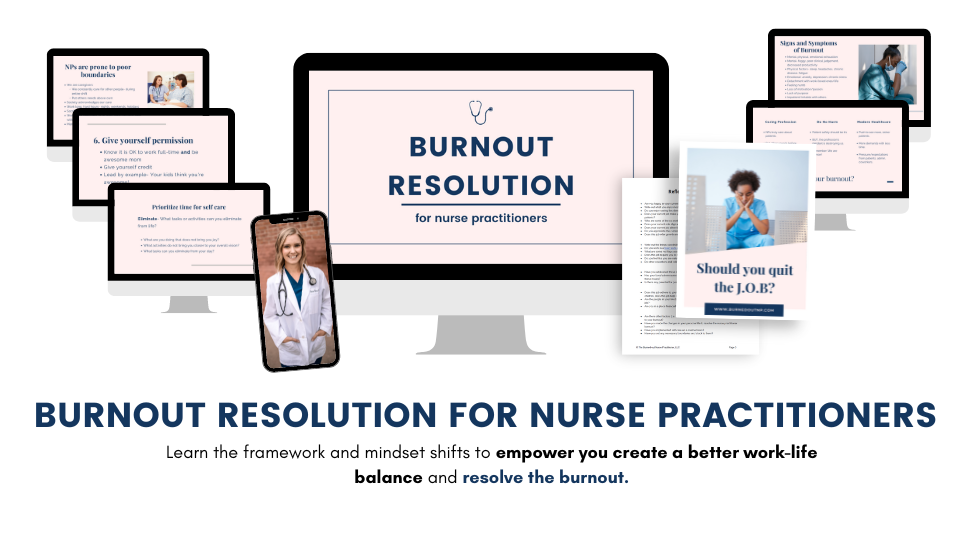Psych nurse practitioners face challenges specific to their specialty that increases the risk of mental health nurse practitioner burnout. (Check out 12 causes of psych nurse practitioner burnout). But with these specific obstacles, how is it even possible to overcome mental health nurse practitioner burnout?
Through my work as The Burned-out Nurse Practitioner, I’ve helped overwhelmed NPs create a better work-life balance and overcome nurse practitioner burnout. I share specific tips for achieving a better balance.
But I wanted to address some of the tips specific to mental health nurse practitioner burnout.
Overcome mental health nurse practitioner burnout
Identify causative agents.
The first step to resolve mental health nurse practitioner burnout is being aware of the current struggles. APRNs need to determine what top three factors are causing their burnout. NPs need to reflect on any professional and personal struggles. APRNs need to determine any contributing factors to lack of work-life imbalance. This way NPs can focus on the top factor in order to overcome mental health nurse practitioner burnout.
Seek support.
This is an important step for psych NPs to do in order to overcome their burnout. Finding others that are struggling with mental health nurse practitioner burnout can help normalize the feelings of burnout. It helps get support from someone who has already experienced and overcame burnout.
Mental health nurse practitioners should seek support from colleagues or other nurse practitioners in similar settings. Find a healthcare person. Join The Burned-out Nurse Practitioner Facebook group. Schedule a coaching session with a burnout resolution coach. You don’t have to go through this mental health nurse practitioner burnout alone!
Practice self-care.
Implementing self-care seems like an overrated way to overcome mental health nurse practitioner burnout. But I cannot stress how important self-care is! We have to take care of ourselves before we can take care of others. We have to ensure we are getting enough sleep, eating a healthy diet, and increasing physical activity.
But self-care is more than this. Self-care is implementing stress relieving techniques. It is doing the activities that bring us joy. It is implementing ways to rest and recharge in between work. Psych nurse practitioners should prioritize self-care activities, such as exercise, meditation, and hobbies, to reduce stress and improve their well-being.
If you struggle with lack of time to implement self-care check out this article.
Set boundaries.
Mental health nurse practitioners should set clear boundaries to overcome burnout. This may include setting limits on work hours or taking time off when needed. Maybe the psych nurse practitioner needs to set boundaries with patients who are entitled or not willing to put in the effort to manage their mental health condition. Maybe the APRN should set boundaries with an overbearing colleague who shoves work onto them. Maybe the nurse practitioner needs to set boundaries in their personal relationships.
Setting boundaries is not being rude, but rather helps NPs better protect their time and energy. This concept helps APRNs overcome mental health nurse practitioner burnout. For more information on boundary setting read: Signs and symptoms you need to set boundaries as a nurse practitioner. And Lack of professional boundaries in healthcare: 4 reasons nurse practitioners are prone.
Prioritize what is most important.
There are only so many hours in the day, but yet there is so much to do. Working as a mental health nurse practitioner can feel overwhelming. Especially if you also have personal obligations, family, and friends. While it can feel overwhelming to complete everything we need to during the day, I encourage nurse practitioners to prioritize what is most important.
For example, I feel my best mentally, physically, and emotionally when I exercise daily and get adequate sleep. I feel fulfilled at the end of the day when I make time for my family. I have learned to prioritize these activities that are most important to me!
Make it a goal to choose one thing a day and no matter what, complete that task! Small changes can make a massive impact! Take action today!
Practice mindfulness.
Psych nurse practitioners can practice mindfulness, which is the practice of being present and aware of one’s thoughts and feelings. This is a challenge when mental health providers work with medically complex patients. Oftentimes NPs thoughts are consumed by patients they saw that day. They think about and worry about their patients. They stress about the amount of open charts and work that needs to be done.
But continuously working on being present in the moment can really help reduce stress, improve the APRN’s own health, and ultimately overcome mental health nurse practitioner burnout.
Improving time management and charting.
Through my work as The Burned-out Nurse Practitioner, I have discovered the #1 cause of nurse practitioner burnout is a lack of work-life balance. And the #1 cause of work-life balance is CHARTING!
So many nurse practitioners are staying late at the office or bringing charts home, disrupting their work-life balance. That is why I created The Time Management and Charting Tips course through The Nurse Practitioner Charting School.
This Time Management and Charting Tips course is designed to teach NPs the tips and tools to chart accurately and efficiently so they can run on time during your workday, eliminate the overwhelm, leave work on time, and STOP charting at home. If you are a psych nurse practitioner struggling with charting check out this course! Also check out The Comprehensive List of Smart Phrases to help save time charting!
Seek professional help.
Psych nurse practitioners should seek professional help if they are experiencing additional symptoms of burnout, such as feelings of anxiety or depression. Mental health providers are at a significant risk of second victim syndrome and unhealed trauma because of their work. This may require working with a therapist and/or medication management to overcome.
As NPs we know it is important to take care of our mental and emotional health, but we don’t always do it. I know my close friend and her therapist colleagues have gotten professional help- there is nothing wrong with that! Please seek professional help if needed!
Advocate for change.
I always encourage psych nurse practitioners to advocate for changes in their workplace or healthcare system! This may include advocating for more resources, better staffing, or improved administrative processes. The benefits of these changes can improve working conditions and reduce mental health nurse practitioner burnout rates. While some factors are out of our control, we can do our best to advocate for what we need as nurse practitioners!
Burnout Resolution for Nurse Practitioners
By implementing these strategies, providers can create a better work-life balance and overcome mental health nurse practitioner burnout. When APRNs overcome the burnout they can take better care of their patients, show up for their families, and take care of themselves.
If you need more assistance with overcoming mental health nurse practitioner burnout, check out Burnout Resolution for Nurse Practitioners. This online, self-study course will teach the framework and mindset shifts to empower NPs to create a better work-life balance and resolve nurse practitioner burnout.


For time management and charting tips, check out The Nurse Practitioner Charting School– The one stop for all documentation resources created specifically for nurse practitioners. Learn more at www.npchartingschool.com

**Full disclosure, this blog post may include affiliate links. I do receive a commission if any of the affiliate programs/services/supplies are purchased. This is at no extra cost to you but does allow me to continue to provide content as The Burned-out Nurse Practitioner! Thank you!




